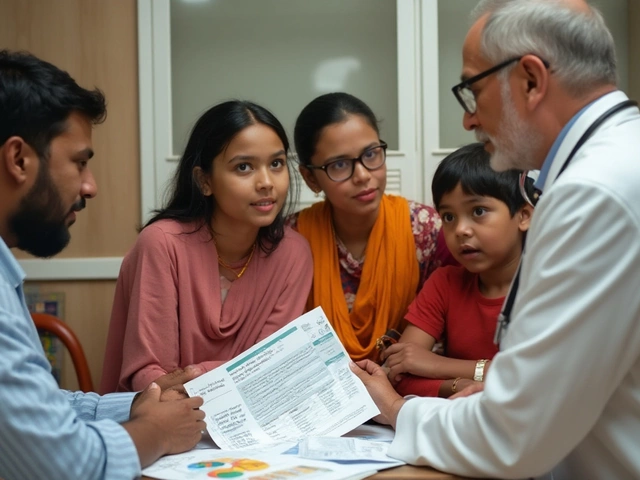
Health checkup packages serve as a proactive step towards maintaining your health and well-being. In today's fast-paced world, regular medical assessments are crucial to catch potential health issues early and manage them effectively. Typically, these packages encompass a variety of tests that evaluate different facets of your health, depending on factors like age, gender, and specific health concerns.
From basic examinations that assess vital signs and bloodwork to specialized screenings for chronic diseases, health checkup packages are tailored to provide a comprehensive overview of your current health status. Knowing what's included in these checkups can empower you to make informed decisions about your health journey.
- Introduction to Health Checkup Packages
- Common Tests Included
- Age and Gender-Specific Screenings
- Specialized Health Packages
- Benefits of Regular Health Checkups
- Tips for Choosing the Right Package
Introduction to Health Checkup Packages
In today's health-conscious age, health checkup packages have emerged as a crucial aspect of preventive care, offering a strategic approach to managing one's health over time. These packages are meticulously designed to cater to the unique health needs of individuals, depending on various factors such as age, gender, and familial health history. At their core, they strive to detect potential health issues at an early stage, proposing timely interventions that could prevent serious complications down the line. They act as a safeguard, enabling individuals to maintain optimal health and avert any underlying medical conditions before they can escalate into major illnesses.
Each health checkup package typically includes a range of fundamental tests. These start from the very basic, such as routine blood pressure monitoring and cholesterol levels, extending to more complex diagnostic assessments that may involve imaging like X-rays or ultrasounds. The primary aim is to provide a thorough assessment of an individual's current health status. Leading healthcare providers curate these packages, often in consultation with specialists to ensure they cover all critical health aspects. With an array of extensive screenings, the ultimate goal is to tailor medical evaluations to fit personal health goals and enhance the quality of life.
Quoting the renowned health expert, Dr. Manya Kumar, "Health checkups are not just about identifying diseases. They are an investment in long-term well-being, allowing for personalized health strategies that adapt as one ages."
Regular screenings not only foster a deeper understanding of one's health but can also significantly reduce healthcare costs in the long run by preventing costly medical treatments that arise from unchecked ailments.
The increasing popularity of these packages is attributable to the growing awareness about the importance of preventive care. As per a study published in the Journal of Preventive Medicine, individuals who partake in regular health screenings report a 15% reduction in hospital admissions due to the early detection of conditions that would otherwise require emergency intervention. Thus, these checkups empower people to take charge of their health, making informed decisions rooted in the specifics of their medical data.
With the multitude of options available, choosing the right package can often feel overwhelming. Consider personal lifestyle choices, existing health conditions, and familial medical history when selecting a package. Many packages offer basic screenings like Complete Blood Count (CBC) and Lipid Profile, while more extensive ones might include thyroid function tests or even cancer markers. Understanding what each package offers is paramount, and consulting with a healthcare provider can help in aligning one's health goals with the right checkup plan. This ensures that the investment in health truly translates into tangible benefits, creating a roadmap that guides an individual towards a healthier future.
Common Tests Included
When diving into the realm of health checkup packages, one might wonder what sort of tests are typically part of these assessments. The backbone of any comprehensive checkup package usually involves a range of medical tests aimed at painting a clear picture of your health status. These tests are designed to evaluate various bodily functions and detect potential health issues before they manifest into something more serious. A standard health checkup will often begin with a basic physical examination where vital signs like blood pressure, pulse rate, and temperature are recorded. This initial assessment provides a foundation upon which further tests can be built.
A critical component of these packages is blood tests, which are quite revealing. A complete blood count (CBC) is often included to provide information about the cells in your blood, helping identify conditions like anemia or infections. Lipid profiles are typically part of the snapshot of your cardiovascular health, measuring things like your cholesterol levels to assess the risk for heart disease. Blood glucose tests are essential for identifying early signs of diabetes, a condition that silently affects millions. Besides these common blood tests, many packages include liver and kidney function tests. These are crucial in ensuring that these vital organs are working properly and can help detect early signs of damage or disease.
Urine tests are another common feature, offering insights into your renal system. This test can reveal infections and other potential issues in the urinary tract that might otherwise go unnoticed. For a comprehensive health check, packages often incorporate imaging tests like X-rays or ultrasounds. These are vital for visual examination of internal organs, check for tumors, or identify structural anomalies. In some cases, more specific imaging tests like mammograms for women or colonoscopies for older adults might be recommended based on age and gender-specific guidelines. Such screenings are crucial in the fight against diseases like cancer, where early detection significantly improves outcomes.
"Preventive care can save lives," noted Dr. Sandra Russell, a renowned healthcare expert. "Regular checkups allow for the early detection of conditions like hypertension and diabetes, before they lead to more severe health complications."
Tests reflecting on lung function such as spirometry can sometimes be included, especially for individuals who have a history of smoking or respiratory issues. This test helps measure how much air you can inhale and exhale, as well as how quickly you can blow air out of your lungs. For those with a sedentary lifestyle or certain familial risk factors, an electrocardiogram (ECG) might be necessary to check heart rhythm, looking for indicators of heart disease. These preventive care tests vary based on individual health risks, but their purpose remains the same: early identification and intervention.
Additional Screenings
Beyond the essential tests, health checkup packages often offer additional screenings that can be selected according to personal health concerns or family medical history. For instance, thyroid function tests are often recommended, especially for individuals who may experience symptoms like fatigue or weight changes that could indicate thyroid disorders. Bone density tests can be particularly important for older adults or post-menopausal women, as they help assess the risk of osteoporosis. In some instances, tests like Vitamin D levels or specific infection screenings (like Hepatitis or HIV) can be requested, providing a more detailed look at certain health aspects.
| Test Type | Target Conditions |
|---|---|
| Blood Tests | Anemia, Cholesterol, Diabetes |
| Urine Tests | Infections, Kidney Health |
| Imaging Tests | Structural Anomalies, Tumors |
| Lung Function | Respiratory Issues |

Age and Gender-Specific Screenings
When embarking on the path of preventive care, the significance of age and gender-specific screenings cannot be overstated. These screenings are meticulous in their focus, tailored according to the typical health challenges faced by different age groups and genders. For instance, as individuals age, the likelihood of certain conditions increases, thereby necessitating more targeted screenings. It's fascinating how our bodies evolve and adapt over time, and equally intriguing is how medical screenings have advanced to accommodate these changes.
For men, especially those over the age of fifty, screenings for prostate health, including PSA (Prostate-Specific Antigen) tests, become important. The wisdom of these medical practices lies in the well-documented evidence that early detection of prostate issues can lead to much better outcomes. Similarly, younger men might focus on cholesterol levels and diabetes screenings, with lifestyle factors often influencing the likelihood of these conditions. Women, on the other hand, may start mammogram screenings in their forties, although recent studies suggest the benefits of even earlier start times for those with a family history of breast cancer.
"Knowledge empowers," notes Dr. Lisa Morgan, a leading health expert. "Understanding the specific needs of your age group and gender helps tailor an effective preventive healthcare strategy."
For both genders, cardiovascular assessments, such as stress tests and echocardiograms, are crucial, particularly as one enters middle age. Blood pressure monitoring and lipid profiles are routine but critical components of these health checkups. By identifying risk factors early, individuals can adopt lifestyle changes that greatly diminish the risk of health emergencies down the line. It's worth noting that these health checkup screenings are not static; they evolve as our understanding of medical science deepens and grows. In recent years, genetic testing has become more commonplace, providing personalized insights into one's predisposition to certain conditions.
Youthful vigor often carries with it a sense of invulnerability but ensuring that regular screenings are part of routine care is a gift to oneself. Health checkup packages for younger demographics might include vaccinations and screenings for conditions that, if caught early, can prevent future complications. As these packages are tailored further, they can now include screenings for mental health, acknowledging the holistic approach needed for true wellness. The future of preventive care is undoubtedly bright, with each generation benefiting from the strides made by the previous one.
In summary, age and gender-specific screenings are not about fear but empowerment. They equip individuals with the knowledge needed to live healthier, longer lives, enabling them to enjoy the moments that matter most. Whether you are at the dawn of adulthood or the golden years, these screenings are invaluable tools in the quest for health and well-being. By embracing these assessments, we not only honor our bodies but also set a precedent for generations to come, showcasing the importance of early detection and prevention as cornerstones of modern healthcare.
Specialized Health Packages
In the realm of health checkup options, specialized packages are designed to cater to specific needs and concerns that go beyond the standard evaluations. These packages typically focus on particular health conditions, risk factors, or life stages, offering a tailored approach that aligns with one's individual health goals. As we dive deeper into these offerings, it's crucial to understand what makes them distinct and worthwhile. Common specialized health packages include cardiac care checkups, cancer screening programs, diabetes monitoring, and women's health profiles. Each of these caters to distinct needs, providing integrated assessments that aid in prevention and early detection.
Cardiac care packages, for instance, are focused on assessing heart health, a critical concern given that cardiovascular diseases remain a leading cause of mortality worldwide. These packages may include tests such as lipid profiles, electrocardiograms (EKG), and stress tests, aiming to provide a comprehensive understanding of heart functioning and circulating cholesterol levels. Similarly, cancer screening packages are invaluable, offering screenings like mammograms, colonoscopies, and Pap smears according to individual risk factors and family history, thereby promoting early detection strategies.
On a different note, diabetes monitoring packages are increasingly popular given the rising prevalence of this metabolic disorder. These checkups focus on blood sugar levels through fasting glucose tests and HbA1c testing. They highlight the importance of lifestyle and dietary habits, making them essential for those already diagnosed with diabetes or at risk. Women's health packages comprise elements such as hormonal assessments and bone density scans, targeting specific health concerns that may arise at various stages of a woman's life.
These tailored packages offer a personalized health strategy, ensuring that individuals receive screenings and tests pertinent to their unique circumstances. By opting for a specialized health checkup, one benefits from a focused pathway that addresses key health concerns proactively. This preventive care approach not only aids in maintaining a balanced lifestyle but also significantly reduces the anxiety associated with potential health issues. As quoted by the World Health Organization,
“Early detection, screening, and diagnosis vastly improve the chances for successful treatment and survival.”Such insights underscore the life-saving potential of these specialized packages and their role in facilitating targeted interventions, ultimately steering patients toward sustained health and well-being.

Benefits of Regular Health Checkups
Engaging in regular health checkups offers a host of advantages that extend far beyond the immediate comfort of knowing your baseline health status. At their core, these proactive assessments are instrumental in the early detection of potential health issues. Identifying concerns like hypertension, diabetes, or high cholesterol before they escalate into severe conditions can dramatically improve outcomes and reduce the need for expensive treatments. For instance, the American Heart Association states that early diagnosis and treatment can lower one's risk of heart disease by about 50%. A commitment to routine checkups, therefore, substantially aids in long-term health maintenance.
Another noteworthy benefit of regular health assessments is the personalized guidance they offer in terms of lifestyle and preventive care. Doctors not only interpret the results of tests but also suggest modifications in diet, exercise, and other daily habits that could bolster your health, specifically tailored to your unique genetic and lifestyle factors. This individualized advice not only addresses the current health situations but also empowers patients to take ownership of their wellbeing, often leading to improved lifestyle choices that positively influence family and friends.
Additionally, regular checkups serve as an important baseline for understanding ever-changing health parameters over time. Such records help in identifying trends and deviations that might otherwise go unnoticed in one-off visits. This ongoing collection of data is crucial for a proactive approach to health care—spotting subtle signs and shifts that may hint at underlying issues. Recognizing these signs well in advance facilitates preemptive strategies, thereby preventing them from unfolding into larger problems later on. As Dr. Keith Roach famously quoted, "A good doctor treats the disease. A great doctor treats the person with the disease." This perspective is immensely facilitated by regular monitoring through health checkups.
Moreover, these regular assessments nurture a trusted relationship with your healthcare provider. This bond is especially valuable, allowing a seamless exchange of concerns and symptoms that might otherwise remain unspoken in more fragmented healthcare settings. The continuity and consistency of care fostered here are integral to receiving contextual and comprehensive advice, along with better health outcomes. Trust in your physician and knowing they understand your health history can result in advice that is more nuanced and inevitably more effective.
Financial prudence is another compelling reason to opt for routine health evaluations. By investing in regular checkups, you often save significantly in the long run by mitigating the risk of developing chronic diseases that are much more costly to manage. Health insurance providers also recognize this value, often incentivizing regular health checkups by offering lower premiums or additional coverage benefits, making this a financially wise choice as well.
"An ounce of prevention is worth a pound of cure," noted Benjamin Franklin. This wisdom is more applicable than ever in today's health-focused society. Taking proactive measures not only saves potential heartache and distress down the line but also paves the way for a life that has been consciously crafted for durability.
Tips for Choosing the Right Package
Deciding on the best health checkup package can be akin to navigating a maze, especially with the options available today. Firstly, it’s vital to consider your personal health history and family medical background. If you have a family history of heart disease, for example, look for packages that include cardiovascular assessments. Likewise, if diabetes runs in your family, a package with blood sugar monitoring and insulin level checks could be invaluable. Knowing your specific needs helps tailor a package that provides the most insightful data about your health.
Understanding what each test entails is another crucial step. Many people sign up for basic packages without knowing the specifics of the tests included. Before committing, ensure you’re getting screenings that provide comprehensive insights rather than just superficial data. This is where a detailed list of the package components becomes essential. When comparing packages, make sure to match the tests not just to your age and gender but also to any symptoms you may have been experiencing recently. Some packages might offer a broad array of tests, but only a few may be relevant to your unique health circumstances.
It’s also a smart idea to consult with your physician before selecting a package. Regular communication with healthcare providers ensures that you aren’t duplicating tests unnecessarily or missing critical screenings. A doctor’s insight can align your testing needs with medical advice based on past observations and predictions about your health risks. As the renowned Mayo Clinic advises, "Routine screening is about more than simply detecting problems; it’s about understanding the risks and making proactive choices to maintain your health."
Experts advocate for periodic reviews of your health plan to adapt to any life changes or emerging health conditions.
Be wary of overly expensive packages that promise a deep dive into your health status but fail to offer anything more than basic packages do. Cost doesn’t always equate to quality or necessity. Packages might market themselves with the promise of the latest technology, but always look for accreditation and reviews. Opt for service providers with proven track records and ensure they are recognized by appropriate health authorities. Trusted clinics and hospitals often provide detailed brochures that are a treasure trove of information regarding what's available. This can be incredibly valuable when trying to figure out the financial aspect as well.
Lastly, consider the convenience of the testing process. In today’s world, many wellness screening providers offer home services, which can be a boon for people with busy schedules. Look into options that allow flexibility in schedule and location. This brings us to the idea of a follow-up—the added peace-of-mind that comes with knowing the package doesn’t just stop at delivering results, but includes a consultation to explain them. Consider packages that offer this additional step, where medical professionals can help interpret the data, proposing next steps or changes in lifestyle based on the findings.





Rohan Talvani
I am a manufacturing expert with over 15 years of experience in streamlining production processes and enhancing operational efficiency. My work often takes me into the technical nitty-gritty of production, but I have a keen interest in writing about medicine in India—an intersection of tradition and modern practices that captivates me. I strive to incorporate innovative approaches in everything I do, whether in my professional role or as an author. My passion for writing about health topics stems from a strong belief in knowledge sharing and its potential to bring about positive changes.
view all postsWrite a comment